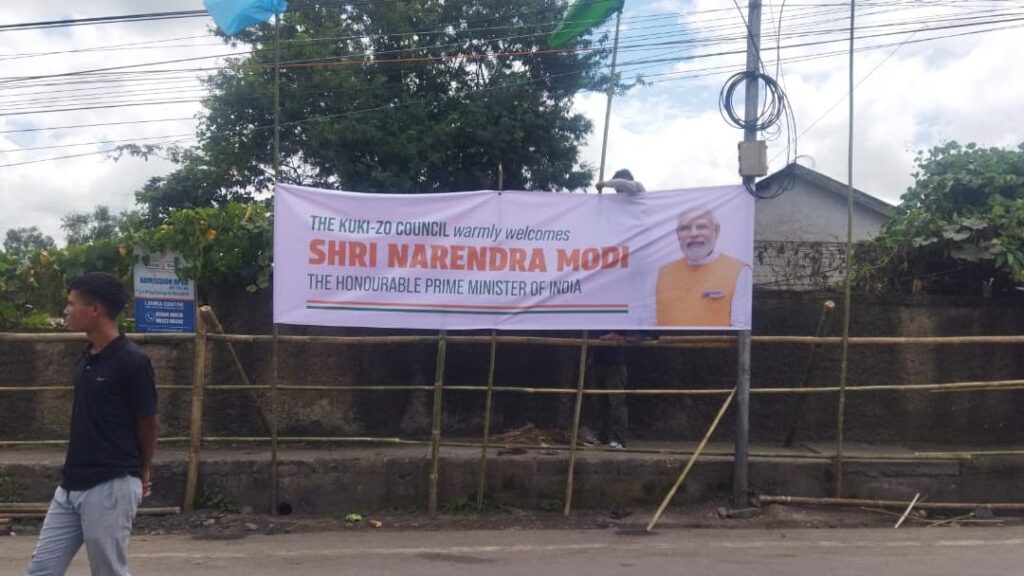Prime Minister Narendra Modi on Saturday is set to make his first visit to Manipur since ethnic violence erupted in the state over two years ago. While his visit has been welcomed by the Meiteis and the Kuki-Zo, their statements have been framed in contrasting ways.
While the Kuki-Zo have welcomed the revised Suspension of Operations (SoO) pact with Kuki militant groups signed on September 4, the Coordinating Committee on Manipur Integrity (COCOMI), a Meitei civil society organisation, has condemned it.
Kuki-Zo groups have also demanded that their areas be made a Union Territory, while COCOMI has demanded a National Register of Citizens (NRC) and the detection of illegal immigrants to correct what it sees as a “demographic imbalance”, labelling the demand for a separate administration as “ethnicisation” that can lead to “Balkanisation” or fragmentation of the region.
Here is how the two stakeholders in the Manipur conflict have reacted to Modi’s visit.
Kuki-Zo
In a statement welcoming the visit, the Kuki-Zo Council, an umbrella organisation representing the interests of Kuki-Zo tribals, said on Wednesday, “For years, we have been voicing our demand for complete separation from Manipur, seeking a separate administration in the form of a Union Territory with legislature under Article 239A of the Indian Constitution. This demand arises not from convenience, but from necessity – for peace, security, and survival of our people.”
“More than 250 innocent lives have been lost at the hands of the majority Meitei community; over 360 churches and places of worship have been reduced to ashes; more than 7,000 homes have been burnt; and over 40,000 of our people continue to live as displaced persons in relief camps, separated from their ancestral homes,” the Kuki-Zo Council’s statement states. “Whether one likes it or not, the stark reality is that the Kuki-Zo people have been forcibly separated by the actions and aggression of the majority community in Manipur. Despite these grave circumstances, we continue to uphold our faith in the democratic spirit and leadership of India.”
On Wednesday, the tribal-led Zomi Council also demanded separation from Manipur, citing powers that Parliament has under Article 3 of the Constitution, through which states like Jharkhand, Chhattisgarh, Telangana and Uttarakhand were created, and Ladakh was made a Union Territory.
The Zomi Council also welcomed the newly revised SoO agreement between the Union Ministry of Home Affairs and militant outfit United People’s Front (UPF-Zomi) as a positive step, seeing it as the “only means for a permanent solution”.
The Centre, the Manipur government and two dozen Kuki militant groups had initially signed the SoO in 2008 to bring an end to hostilities. The pact was extended annually until it expired in February 2023. But in 2023, the Manipur government unilaterally scrapped the SoO. However, on September 5, 2025, the Home Ministry signed a revised SoO days before the PM’s visit to the state, at a time when Manipur is under President’s Rule. The new terms of the SoO include relocation of camps from near Meitei areas and honouring “the territorial integrity of Manipur”.
In anticipation of the PM’s visit, the Kuki-Zo Council also agreed to lift the blockade of National Highway 2 for free movement of commuters and essential goods.
A joint press release by the Kuki Civil Society Organisations of Churachandpur has also welcomed the PM, saying, “We appeal to the visiting dignitaries to acknowledge and honour the sentiments of the local populace, who have endured deep-rooted discrimination. We hope this maiden visit marks the beginning of a path towards justice for the Kuki-Zo people.” The statement also urged the general public to participate in the events that are part of the visit in large numbers.
Meiteis
However, the COCOMI’s statement, issued on Friday, sees the Kuki-Zo demand for separation from Manipur as “ethnicisation” of citizenship and statehood. “This visit must not carry even the slightest trace of exclusion or ethnic favouritism. Any attempt to ‘ethnicise’ citizenship or statehood will only accelerate Balkanisation rather than foster unification. The PM’s message must instead reaffirm equality, justice, and security for all indigenous peoples of Manipur,” the statement said. COCOMI convener Khuraijam Athouba confirmed to The Indian Express that the line was aimed at pointing out the dangers of the statehood demand.
COCOMI also called for an NRC-like exercise in Manipur to detect illegal immigrants. “The COCOMI’s stand is clear: The detection of illegal immigrants and immigrant-origin populations in Manipur is the key to resolving the unnatural demographic expansion that has severely distorted the state’s social and political balance. An NRC or a similar robust mechanism is essential,” its statement said, welcoming the PM but urging that the visit should not become tokenism or selective engagement.
COCOMI also called for the resettlement of displaced people who are in relief camps. “Equally crucial is ensuring the constitutional guarantees and fundamental rights of every Manipuri, which have been curtailed or denied for the past two years, especially the right to free movement across every part of the state. Without the restoration of these rights, peace will remain hollow and incomplete,” it added.
It underlined, “The Prime Minister must issue a clear warning to all forces that obstruct peace, exploit the vulnerable, or seek to destabilise the state: We must not tolerate proxy wars, narco-terrorism, or demographic aggression.”
On the revised SoO that was signed on September 4, the COCOMI statement took exactly the opposite line to the Kuki-Zo groups, asserting, “The Prime Minister must end proxy war in the name of a deceptive pact called SoO which is central in the ongoing crisis.”

